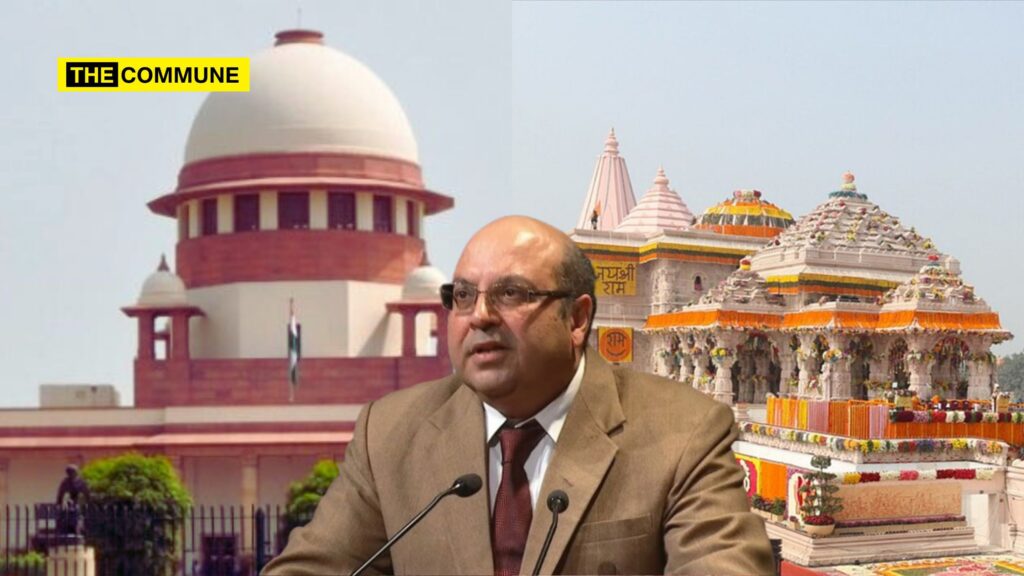On December 6, 2024, former Supreme Court Justice Rohinton Nariman criticized the 2019 Ayodhya verdict, calling it a “mockery of justice” and an insult to secularism. Speaking at the Ahmadi Foundation’s inaugural lecture, Nariman alleged that the judgment undermined the nation’s secular fabric and emboldened communal disputes. However, his critique ignores the Supreme Court’s rigorous reliance on historical evidence and legal precedent, recognising the Ram Janmabhoomi site’s centuries-old significance to Hindus while providing alternative land for a mosque.
In 2019, the Supreme Court of India delivered a landmark verdict resolving the protracted Ayodhya Ram Janmabhoomi dispute. The ruling affirmed that the disputed land belonged to the Ram Janmabhoomi Temple Trust, recognizing it as the birthplace of Lord Ram for centuries. The Court further directed the Trust to construct a temple at the site. This decision, though welcomed by many, drew criticism from certain leftist and liberal factions, who alleged judicial bias. Five years later, the Ram Temple in Ayodhya stands as a monumental structure, drawing millions of Hindu devotees, but debates over the judgment persist.
Speaking at the inaugural lecture of the Ahmadi Foundation, established in honor of Justice Aziz Mushabber Ahmadi, Justice Nariman raised concerns about the communal implications of the judgment. He highlighted the surge in legal suits involving not only mosques but also dargahs, warning that such disputes could lead to increased societal disharmony, contrary to the ideals of the Constitution and the Places of Worship Act.
Justice Nariman referred to the 2019 Constitution Bench’s interpretation of the Places of Worship Act, emphasizing that the Act prohibits changes to the religious character of places of worship as of 15 August 1947. He stated that any attempt to alter this status quo should be dismissed to uphold the secular fabric of the nation. He also criticized the origins of the Ram Janmabhoomi movement, describing the karseva initiative by the Vishwa Hindu Parishad in 1984 as a “dictatorial” and “tyrannical” demand for temple construction.
Drawing from his experience with cases arising from the Babri Masjid demolition in 1992, Justice Nariman noted the prolonged delay in processing two FIRs—one against the karsevaks and the other against political leaders allegedly involved in inciting the events. He remarked that no significant progress was made until 2017 when he and Justice Pinaki Chandra Ghose addressed the matter.
Justice Nariman accused sections of the Hindu community of acting unlawfully in the Ram Janmabhoomi case. However, historical records suggest otherwise, as the Hindu side pursued their claim through legal channels, progressing from the British judiciary to the Supreme Court. They consistently sought justice within the legal framework, even amid allegations that their deity was imaginary. The fact that the Babri Masjid stood until its demolition in December 1992 further challenges the narrative of unlawful action by Hindus.
Nariman also expressed disappointment over the failure to reconstruct a mosque at the site after the Babri demolition, calling it a “travesty of justice” and suggesting it would have served as appropriate compensation. However, this perspective disregards the centuries of injustice experienced by Hindus, for whom the construction of the Ram Temple represents true restitution.
Criticizing the Supreme Court judgment, Nariman argued that secularism had been compromised, implying that it could only be upheld if Hindus had relinquished their claims without protest. He also voiced concerns over the growing number of petitions challenging the construction of mosques and dargahs on sites allegedly built over demolished temples. Describing these petitions as “hydra heads,” he warned that they could exacerbate communal tensions.
Concluding his lecture, Justice Nariman called for the strict enforcement of the Places of Worship Act of 1991, asserting that tolerance and communal harmony could only be achieved by preventing legal challenges to historical religious vandalism. He maintained that the law should restrict Hindus from addressing the destruction of their sacred sites.
Justice Nariman’s criticisms of the Ayodhya verdict align with earlier comments by his father, Fali S. Nariman, a distinguished lawyer who expressed discomfort with a Hindu monk becoming the Chief Minister of Uttar Pradesh. Rohinton Nariman himself has made controversial statements regarding the status of women in Hindu traditions, citing the Rigveda. It raises a pertinent question: how would such remarks be received if directed at texts from other religions? This remains a vital test of the tolerance and secularism he advocates.
(With Inputs From OpIndia)
Subscribe to our channels on Telegram, WhatsApp, and Instagram and get the best stories of the day delivered to you personally.

